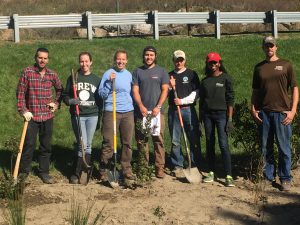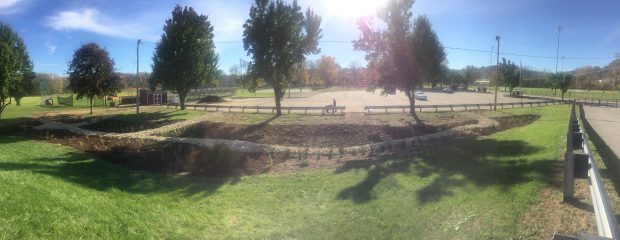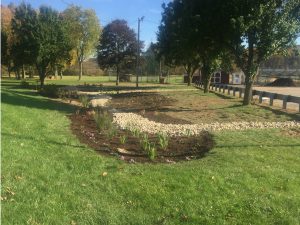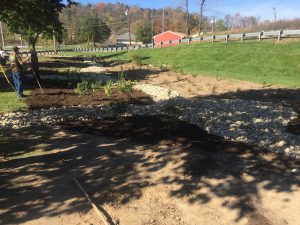New Jersey Future Blog
Rain Garden Partnership in Newton Brings Learning Opportunity, Better Water Quality
November 3rd, 2017 by Kandyce Perry
 Many towns in New Jersey have streets, intersections, or parking lots that flood during heavy rains. And if a parking lot, for example, drains into a crucial waterway, it could pose a serious threat to water quality. How does a town fix this type of flooding problem?
Many towns in New Jersey have streets, intersections, or parking lots that flood during heavy rains. And if a parking lot, for example, drains into a crucial waterway, it could pose a serious threat to water quality. How does a town fix this type of flooding problem?
It can be done with green infrastructure.
Green infrastructure is an approach to managing stormwater by enabling it to infiltrate into the ground where it falls or by capturing it for later reuse like irrigation or flushing toilets. In addition to reducing pollution from stormwater runoff and returning clean water to the ground, green infrastructure offers many additional benefits, including cooling and cleaning the air, beautifying neighborhoods, aiding in traffic calming, enhancing property values, and more.
Given these benefits, the Town of Newton decided to employ green infrastructure to tackle a major local flooding issue. A parking lot in Memory Park, one of the town’s most used parks for football games and other activities, often flooded. The runoff from the parking lot drained directly into the Paulins Kill, a tributary of the Delaware River.
In 2016, New Jersey Future entered into an agreement to work with Newton as a pilot town for its Mainstreaming Green Infrastructure program, which assists communities in using green infrastructure. As a part of the relationship with Newton, New Jersey Future would pay for Rutgers University Cooperative Extension Water Resources program to do a green infrastructure design for one project. Because of the impact it would have on the town and Paulins Kill, Newton officials chose the Memory Park parking lot. Rutgers’ design — a rain garden that captures all of the parking lot’s runoff — moved the parking lot improvement from just an idea to an imminent project, which allowed the Wallkill River Watershed Management Group (WRWMG), the nonprofit watershed organization of the Sussex County Municipal Utilities Authority leading the effort, to secure additional funding to cover the materials and labor necessary to install the rain garden, which include grants from NJDEP 319(h) Non-point Source Grant Program, the William Penn Foundation, and National Fish and Wildlife Foundation.
The rain garden was completed in late October with help from WRWMG, the Town of Newton, Rutgers, New Jersey Future, New Jersey Audubon, Cerbo’s Greenhouse and Nursery in Hampton, and even students from Newton’s Merriam Avenue School. The next step is for WRWMG to install educational signage.
The new rain garden will serve as a vital tool to improve water quality in the Paulins Kill, but also as a demonstration to community members of the power of green infrastructure.



















